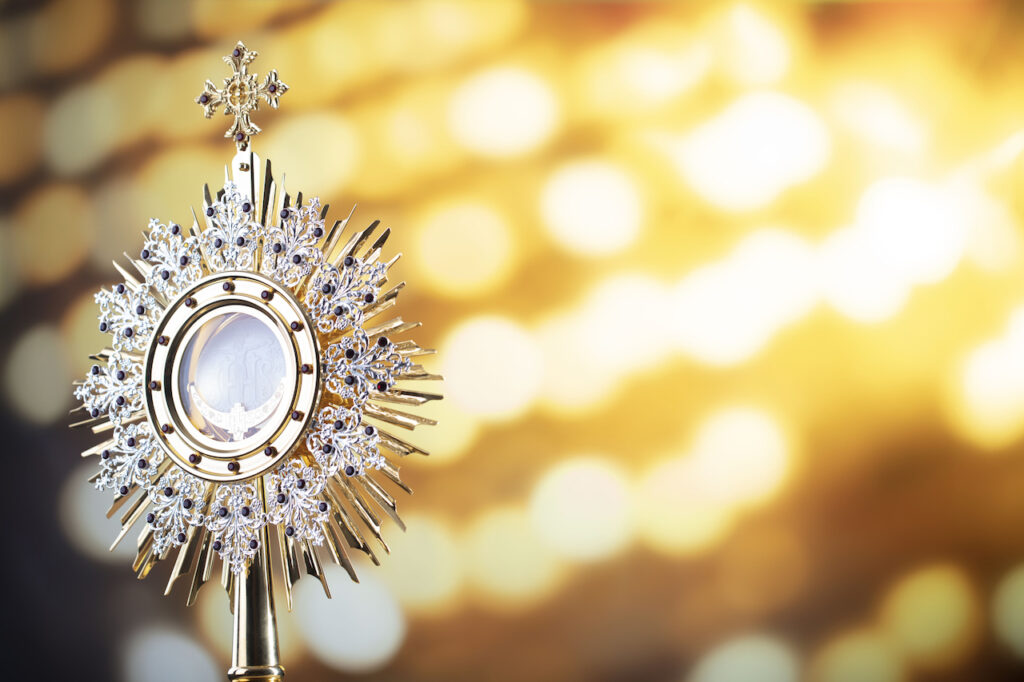Recently, I interviewed a Missionary of Charity in the Bronx who told me about a time she was working in the convent garden and noticed a man on top of a nearby high-rise. He was leaning over the edge with one foot.
It was a serious scene. Quickly, there were police, and a net was placed underneath him.
Moved with fear and compassion, she ran inside, calling, “Sisters! We must pray! A man is thinking about jumping from the roof!”
Every sister in that house hurried to the sidewalk. One of them, Sister Clare, had a moment of inspiration: “We must get Jesus!” With the permission of the convent superior, the Eucharist was brought out to the sidewalk and quickly passed along to a priest who had joined the prayers.
Something incredible happened.
Father ran toward the troubled man as the sisters continued praying on the ground. At the top, he got the man’s attention. Softly, gently, but with conviction, he said, “You are loved. Jesus is here. Do not be afraid. Jesus is here.”
His words, thankfully, penetrated the man’s awareness. The troubled man slowly moved from the edge and made his way toward Father, then he collapsed and sobbed into his arms.
We may never know what occurred in that man’s heart that day or what he personally experienced from the sacramental presence of Jesus. But we do know things by their fruits. Something changed for this man when he met Jesus. Something happened when Father brought Jesus to a soul in trouble.
Now, not all of us have such intense moments in our lives, but we all experience times of need. We all endure periods of anxiety, loneliness, unfulfillment, or despair.
Navigating the human heart is a universally human mystery of experience. By coming to terms with our own struggles and vulnerabilities, we can begin to find common ground with others.
Jesus, though God, was not exempt from the very human experience of loneliness. In this communion with each other and Jesus, we can foster empathy, understanding, and find opportunities to seek and offer support in times of need.
The Eucharist is a communal experience. In receiving the Eucharist, a diverse group of individuals with varied backgrounds come together under a common love, a common faith. We are not alone. We are surrounded by fellow believers, united in our devotion and we become one body. We remember that we are part of a larger spiritual family, sometimes isolated but never truly alone.
Encounters with the Eucharist are also deeply personal and intimate moments with Christ, who offers us his constant love, grace, and companionship.
The encounter between Jesus and the man on the roof was a powerful reminder that God truly speaks to and reaches the human heart. He alone is the answer. In his book, “The Shattering of Loneliness,” Bishop Erik Varden of Norway wrote, “It is God who degrades himself for love, stooping down from celestial realism to reshape and reinspirit humble matter.”
Encounters with God in our vulnerable humanity assure us that we are loved unconditionally, and so we are accompanied, always. Thus, the Eucharist becomes a source of comfort, solace and profound connection to Our Father who loves us.
The Eucharist is a powerful remedy for our hearts. It brings us into communion with Christ Jesus, who is God and man, and who loves us. It brings people together in a community of faith that calls us to love and serve others.
These aspects of a Eucharistic life create a profound sense of connection, meaning and spiritual companionship as we journey together.
In the Eucharist we are known. Loved. Seen. We do not need to be afraid in front of the One who comes to us in our loneliness and need.
Molly Judd is the Director of Content for the National Eucharistic Congress. A Benedictine College alum, she interned with the Holy See’s delegation to the United Nations, Caritas Internationalis, in Geneva, Switzerland.

